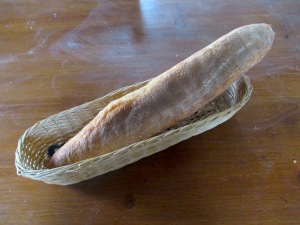One morning in October of 2012 I had to interrupt my work in order to defecate. There was nothing particularly unusual about this, of course, but the moment sticks in my memory because I decided I would explain where I was going to my French coworkers. It was a simple sentence – “I am going to take a shit,” – and I knew all the French words that would be necessary. Je vais prendre une merde.
I’d just opened my mouth to declare my intentions when something made me hesitate. “Taking a shit” is a phrase that any native English speaker would be familiar with. But would it work in French? Translated literally, the sentence conjures up an unpleasant scene: a (hopefully gloved) hand reaches into a toilet bowl and emerges, dripping, with a single turd. And then what? Is it sealed in tupperware and placed in the refrigerator? What possible reason could a person have for taking that? In vast quantities and if treated properly it could be used as fertilizer, I suppose, but one lonely, solitary shit?
I closed my mouth and frowned. Clearly this would be more difficult than I’d thought.
I’d arrived in France about six weeks earlier with virtually no French. My mom spent part of her childhood in France and teaches high school French, and I grew up singing French songs, but although I had the sound of the language in my ears, I’d never studied it. The words of the songs ran together in my mind into an unintelligible string of syllables, and my vocabulary was limited to little more than thank you, yes, no, and bread. (Oh yes, and shit, which a family friend translated for me as part of a history lesson – it’s said that when one of Napoleon’s generals was asked to surrender, he replied, “Merde!”) A friend had taught me how to say “Would you like to look at the stars with me?” and “Would you like to come back to my château tonight?”, but in a village of sixty people, most of whom are either children or retired, those phrases aren’t as useful as one might hope.
My host family speaks excellent English, so communicating with them was rarely a major issue. But my coworkers were another matter. My first days of work consisted of rebuilding the retaining wall of what had once been a moat, and my contribution to conversation was mostly pointing and grunting. Whereas students who are studying French in school might start by learning how to introduce themselves and then move on to ordering food at a cafe, the first words I picked up were those related to the work I was doing: “wall” (mur), “stones” (cailloux), “chisel” (burin). As we shifted to different projects my vocabulary grew to include “flagstone” (dalle), “beam” (poutre), and “radiant floor heating system” (system de plancher chauffant).My personal favorite is pied de biche, the French word for “crowbar”. It translates literally as “foot of the doe”, and somehow manages to sound delicate while perfectly describing a tool used for applying immense force.
Outside of work, the scope of the language was daunting, especially when I would try to understand conversations between fluent French speakers. The process was complicated by little twists in the language that change the meaning from what you might expect. For example, pas terrible translates literally as “not terrible” but actually means “pretty bad”. But the words came, eventually. In an odd way, my lack of background in French was helpful. The fact that dignity was never a possibility freed me to make a spectacular fool of myself, which I did quite happily. People I spoke to were very patient (and no doubt somewhat amused) with my linguistic stumbling, and full of questions and stories. I talked with a coppersmith who had worked in Libya about classical Arabic literature, with a local artist about his father’s involvement in the French Resistance, and with a historian about the challenges of restoration, and through all of these conversations my vocabulary and confidence with the language continued to grow.
At times I was reminded that communication is not all verbal. While eating lunch one day I broke off a piece of baguette and placed the rest of the loaf back in the bread basket, upside down. Xavier hooted with laughter while Jean-Claude reached over and flipped the baguette back up again. When I asked why I got two explanations. Flavie told me that bakers used to designate a loaf reserved for the executioner by turning it upside down, so it is considered bad luck. Stephane offered a slightly different version of the story, although no less juicy: a loaf turned on its back was reserved for a woman who earns her living on her back – a prostitute.
By the end of my three months in France, my grammar was still atrocious, and because I’d learned virtually everything through speaking rather than reading, so was my spelling. But I could speak well enough to express whatever it was I wanted to say in most situations, and if people spoke slowly and clearly to me, I could usually understand most of what they were saying. And then I left.
For the last year and a half, I’ve jumped at any opportunity to speak French, but they’ve been few and far between. My desire to solidify what I’d started learning was a big part of the reason I wanted to return to France. And now here I am. My French was a bit rusty but it’s come back quickly. Last night I found myself talking with Marion about prairie ecology and the role of fire in keeping grasslands from being overgrown with trees. My French was far from perfect – instead of “bark” I said, “the stuff that is on the side of trees.” Pas terrible, but also not terrible, which is more than I could have said for myself two years ago.
As for that shit, I finally decided to go with a more self-explanatory phrase: “Je vais faire une merde.” I am going to make a shit. Stephane gave me a funny look and burst out laughing. It may not have been quite the right way to say it, but he understood what I meant. And sometimes learning from your mistakes can be pretty fun. It turns out that the best translation of “to take a shit” is couler un bronze, “to cast a bronze”. So the next time you’re, uh, making a deposit, think of it as an art form. Just don’t let anybody take your masterpiece.



excellent
Pretty sure this is your best post yet. Miss you superstar!